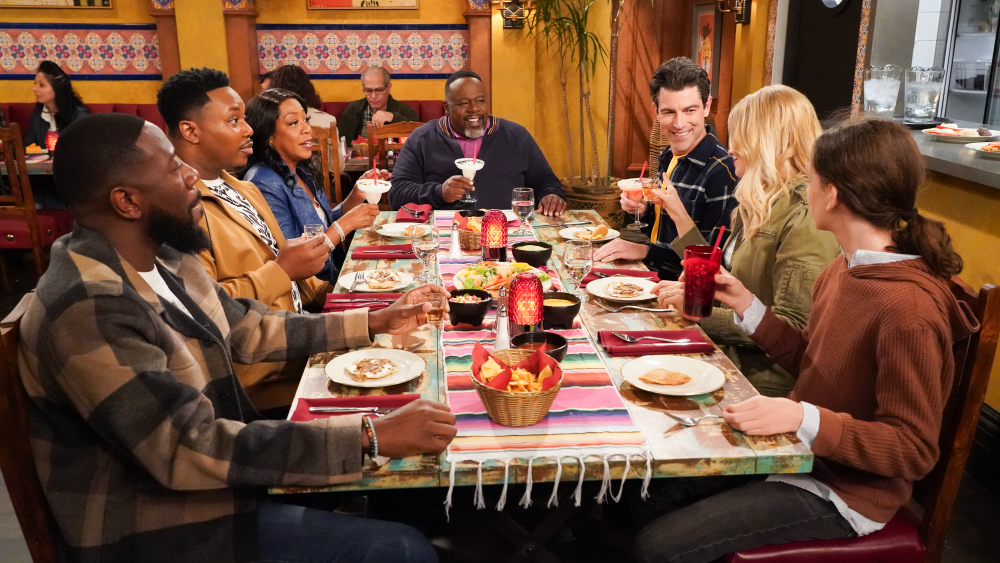SPOILER ALERT: This article contains spoilers from “Bienvenidos a Nosotros,” season 7, episode 8 of “The Neighborhood,” now streaming on CBS.
Max Greenfield earned Emmy and Golden Globe nominations for his portrayal of the obsessive-compulsive, kimono-wearing Schmidt in the hit comedy series “New Girl,” which ran on Fox from 2011 to 2018. And in the Season 7 episode of “The Neighborhood,” “Bienvenidos a Nosotros,” Greenfield’s inner Schmidt comes out as his character Dave must stop himself from finishing his teenage son Grover’s (Hank Greenspan) Spanish homework.
Greenfield says he sees parallels between the two roles, although he says Dave has a less over-the-top, dramatic mentality than Schmidt, and favors pragmatism. “There will be overlap in everything I do. The big difference is that Dave is very open and positive, and he doesn’t have the cynicism that Schmidt inherently has,” says Greenfield. “It’s fun to just play completely open and vulnerable and optimistic about every interaction you have as a character.”
Monty Brinton
Greenfield says one of the elements of “The Neighborhood” he loves is the tonal consistency of the episodes. He says “The Neighborhood” is the kind of comedy he grew up with, and it inspires both a certain appreciation and intimacy in viewers. “Your goal is for an audience to fall in love with these characters and feel close to them so that when [fans] When you look into their living room every week, you really feel like you know and trust these people,” says Greenfield. “Part of that confidence is knowing what you’re going to get every week. Every Monday night I go get Calvin and Dave – I get to tune in to ‘The Neighborhood.’
Monty Brinton
Greenfield adds that he continually uses real-life experiences to inform his approach to various scenes for “The Neighborhood.” Monday night’s midseason finale feels especially realistic for him, because Greenfield himself has a 14-year-old daughter at home. “It starts off as a pure love affair and then a shift happens,” Greenfield says of the dynamic between Dave and Grover in this episode. ‘This also happens in real life, where you are a kind of guide for the person you have given all this love to. And now that parenting has to become: ‘How do I shape this person into adulthood?’ – and it was a lot of fun to find out the funniest version of who Grover could be when he gets older.” (Greenfield says that while his parenting style differs drastically from that of his on-screen counterpart, the writers have done an excellent job of summoning the most comedic potential from the energy simmering between Dave and Grover.)
Later in the episode, Dave supports his neighbor Malcolm (Sheaun McKinney) when Malcolm’s family ignores the fact that he has been published in a prestigious literary magazine. After congratulating Malcolm on his achievement, Dave gives both their families copies of the book that includes Malcolm’s writing. “This is an achievement and it should be celebrated by the people who love you most,” Dave tells Malcolm before bringing out a mariachi band to celebrate his friend.
Monty Brinton
“That’s what the show is,” Greenfield says of this moment. “Connection points between these characters that wouldn’t necessarily be together in any other circumstance, and finding common ground.”
He explains how the emotional core of “The Neighborhood” lies in the consistency with which the Johnson and Butler families come together to form a genuine bond as neighbors.
Greenfield cites “The Big Bang Theory” – which also aired on CBS – as an example of a successful series that maintained a steady emotional tone throughout its twelve seasons.
“Sheldon doesn’t change that much,” Greenfield says, laughing. “I think people love that. I like that [Dave] does not change. Because the character is so consistent, I keep coming back to it for that very specific reason. There’s something really nice about consistency and how [these characters] don’t change. These are the kind of shows where you really feel like I’m inviting these people into my home.”



